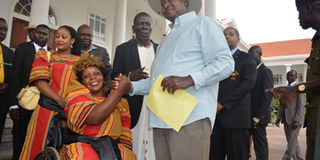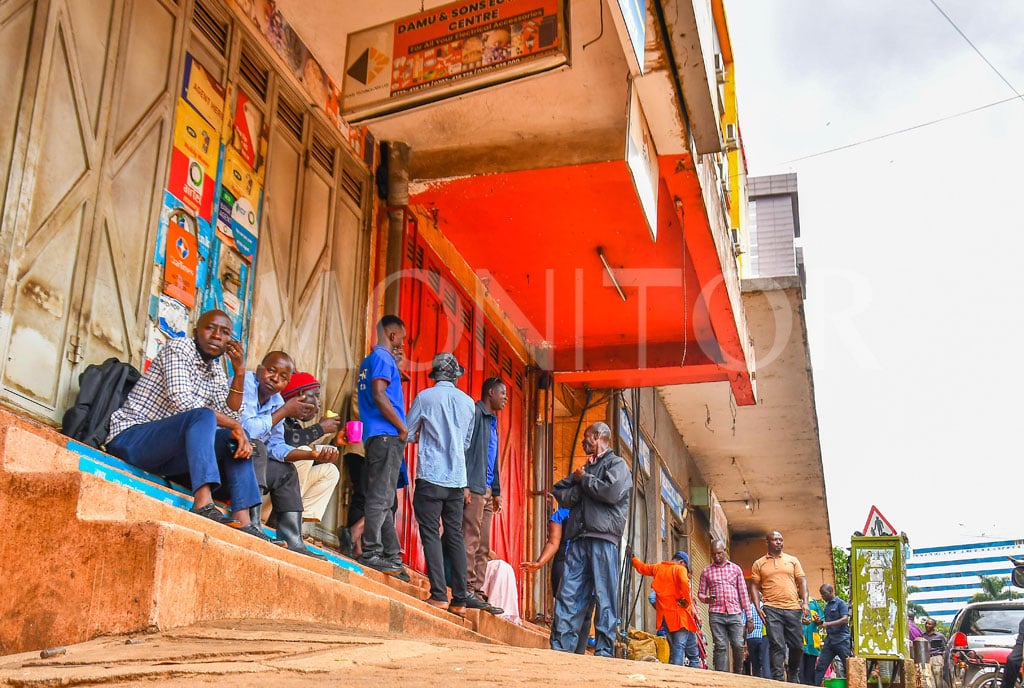Kyalimpa’s willpower is stronger than legs can provide

Vaster Kyalimpa was among the athletes that were flagged off last year by President Museveni to participate in the Commonwealth Games. PHOTO BY Amina Babirye
What you need to know:
For Vaster Kyalimpa, there is nothing too hard to outride. Although she is physically challenged, she is an all-rounder sportswoman, who has taken on the mantle to coach able-bodied rowers. She is also trying a hand at power lifting which has seen her participate at different sports events.
Many people in her state, especially those living in Kampala, survive by begging on the streets. They can’t earn a living without the help of Good Samaritans. Vaster Kyalimpa chose to live differently. Although she was born with infirmity on both legs and crawls like a toddler to places that can’t be accessed by a wheelchair, Kyalimpa won’t go around begging. From buildings that have no facilities for the physically-challenged and public transport in Kampala that is only tailor-made for the able-bodied, Kyalimpa has beaten odds to stand out from her peers.
Sport is one avenue that has given her several openings. Kyalimpa has tried her hands at athletics, rowing and power lifting. And her decision to do sports is paying off.
At the Commonwealth Games held last August in Glasgow, Scotland, she was one of 62 sportsmen that represented Uganda. Competing in power lifting, she was, however, the only team member confined to a wheelchair.
Although she didn’t win a medal at the Games, Kyalimpa left Glasgow a satisfied woman.
“I learnt a lot from the Games,” she said at the conclusion of the Games. “I am a newcomer in this game (power lifting). It’s actually a big shock for me that I was selected to compete at such a big event,” she added.
Starting out
Kyalimpa only joined power lifting in March. Such is the gift in her hands that a month later, she boarded the plane for the first time while travelling to Dubai for a classification tournament. “After Dubai, I was told I qualified to compete at the Commonwealth Games but I didn’t get excited because I know how things work in Uganda.”
Like most Team Uganda members, she was not sure of travelling to Glasgow due to lack of government funding until a few days to the trip when President Museveni intervened with full-board sponsorship.
While Kyalimpa travelled with an assistant because of her state, the long journey to Glasgow came with several challenges. At Dubai International Airport, the team spent more than 12 hours in transit waiting for a connecting flight to Glasgow.
“I had never slept at an airport. But unlike in Uganda, people like me are given special treatment in other countries. The wait was long but I was taken to a comfortable room where I stayed with other disabled people,” she recalls. In the Games Village where all the athletes stayed during the Commonwealth Games, Kyalimpa was a darling to many.
“I made many friends from all over the world,” she said. Partly because the helper, her niece, she travelled with was a very attractive young woman, Kyalimpa’s room was frequented by visitors. Male athletes and officials thronged her room till late in the night. “I don’t think I ever slept before midnight,” she says.
The downside
After the Games, Kyalimpa’s helper travelled to London but never returned in time for the team’s flight back to Entebbe. That was Kyalimpa’s toughest time in Glasgow.
Team Uganda officials tasked her to explain the whereabouts of the helper.
“She travelled to London to see her relatives and even promised to do some shopping for me,” she laboured to explain. With the helper gone, checking out from the Games Village was equally challenging for Kyalimpa. She had heavy bags to pack and help wasn’t easily forthcoming since her teammates had similar assignments.
The troubles aside, Kyalimpa is encouraged to continue with the sport and attract several other physically-handicapped people to join.
“I realised that if I train hard, I can beat many other people at such competitions. All I need is getting a good coach and facilities. I believe I can win an international medal for Uganda,” she said. “I have seen several other lame people in Kampala who have the potential to do well in such sports. I will start organising them into one unit so that we can train together and build a strong team.”
Born in Rugyeyo, Kanungu District, 35 years ago, Kyalimpa is an all-round sportswoman. In fact, she says, she can do any sport including playing football given the opportunity.
Before taking up power lifting, she was famed for cycling in the MTN Kampala Marathon.
Since the Kampala Marathon started in 2004, she has won all the women’s wheelchair competitions but one. “Even without legs, I have always loved athletics since childhood. I watched the wheelchair competitions in Glasgow and felt I could beat most of those people. It’s just that back home, there are no opportunities for us to feature is such events,” added the mother of one.
Without any swimming knowledge, Kyalimpa has ventured into rowing, a sport that requires someone to spend several hours floating on water in a boat. “I heard an announcement calling for anyone interested in undergoing training as a rowing coach and I thought I should join.
I completed the training and I am now a certified coach for able-bodied rowers. I believe I can make a good coach for able-bodied athletes. I have also started swimming lessons but I am not yet good. I still need floaters to swim properly.”
Challenges in daily life
I live on Salaama Road in Makindye Division, Kampala. Every day, I wake up early and move to my workstation on Namirembe Road. I deal in second hand clothes with a working capital of about Shs2m.
Before moving to Namirembe Road, I was operating just outside New Taxi Park but Jennifer Musisi (KCCA boss) chased us about two years ago. Fortunately, President Museveni allocated all physically challenged traders a plot on Namirembe Road. We hope to construct stalls very soon. Sometimes I don’t have enough money for transport.
On such days, I ride my wheelchair from home to Kibuye and take a taxi to town. In the evening, I also ride from town and board at Kibuye back home. When I cycle all those kilometres, I take it as part of training. I would love to go to the gym everyday but it’s expensive to pay Shs3,000 to access the gym. Then, I also have to pay a trainer and at least one more person to work beside the coach and keep watch of the weights.
When I run out of energy during training and can’t control the weights, the coach and the other person, are there to hold them so they don’t hit my chest. But at times, money to pay these people is scarce. During training days, my appetite is very high and I need lots of food. However, on days that the business is not doing well, I can’t afford three meals. Sometimes, I train on an empty stomach.
Music career
By the way, I am good musician. I can sing and even perform at big shows. But the hustle at concerts in Kampala is too tedious. In early 2000s, we had a musical group for the lame. It was called Abalema Tubebeye Group. We had good instruments.
We were making good money but some wrong characters destroyed the group and even sold off our machines. I once composed a song for President Museveni and he liked it. When I get money, I will produce a video.
Life in Kampala
The few times I have travelled, I have realised that the government doesn’t care about us, the disabled. For instance, in Scotland, every public vehicle has a provision for the disabled. The buildings are easily accessible which is not the case here.
In Kampala, taxi operators don’t want us in their vehicles. When you board with your wheelchair, they want you to pay an extra fee. Cycling on a rainy day is also unbearable. When there is teargas, I suffer. In most cases, everyone abandons me but I always try to get away safely. That’s why I try to work out at the gym. I want to be fit all the time.
Family life
I come from Kashojwa, Rugyeyo. My mother is Elivaida Binenama, a peasant. My father died a long time ago. I was born without legs. During childhood, I would crawl several kilometres to school. I studied at Kishororo Primary School until P.5. That’s when I got my first wheelchair. I later joined Masindi Centre for the Handicapped where I completed Primary Seven. I then joined a certain school in Kireka, Wakiso District, to study tailoring but my cousin who was paying my fees died after one year so I couldn’t continue.
I was born in a family of five (three girls and two boys). I am the last born. Unfortunately, most of my siblings have died. We are only two girls left. My last brother died last September. I nursed him for two years, spending almost all my earnings on his treatment.
We tried our best but God had other plans. I once fell in love. I met a man with whom I spent some good years. He made me pregnant but later denied responsibility. I gave birth to a beautiful girl.
She is now 10 years old. The father went to South Africa and has only seen her once, in 2010. Men can be so evil. He doesn’t even bother to find out how I get money to pay the girl’s fees. But I am happy she is doing well in school. I will do my best to ensure that I keep her in school.




